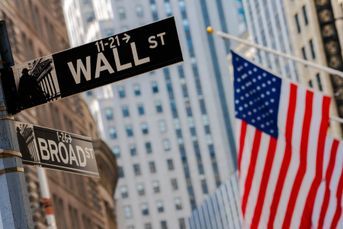‘We love equities,’ says BlackRock boss Laurence Fink
BlackRock chief executive Laurence D. Fink is more bullish on U.S. equities than bonds because companies are benefiting from the weak dollar and have surplus cash to invest for growth
BlackRock chief executive Laurence D. Fink is more bullish on U.S. equities than bonds because companies are benefiting from the weak dollar and have surplus cash to invest for growth.
“We love equities, we love dividend stocks,” Mr. Fink said on Bloomberg Television last week in Hong Kong. “You own Treasuries because you’re worried about the world and the future, but if you believe the world is a good place to invest for the long cycle, you have to be in equities.”
Mr. Fink, one of the co-founders of BlackRock Inc. in 1988, built what is now the world’s biggest asset manager through acquisitions, including the purchase in December 2009 of Barclays Global Investors. He said in a March 3 interview that he’s a “big buyer” of the U.S. dollar, doesn’t see a “bear market” in bonds and would buy Treasuries if yields rose above 4%.
“If you just could get a 4% growth in equity markets and a 3.5% dividend, you’re earning 7.5%, basically approaching what your liabilities are,” Mr. Fink said. “Global liabilities are anywhere from 7.5% to 8% and you can’t earn your liabilities earning 3.5% in 10-year Treasuries.”
Ten-year Treasuries were yielding 2.96% at the close of the market June 1.
Mr. Fink said he “would not be surprised” to see 10-year Treasuries yielding between 3.5% to 3.6% by the end of the year.
Bill Gross, who runs the world’s biggest bond fund at Pacific Investment Management Co. LLC, is increasing his bet against U.S. government debt. Pimco’s $241 billion Total Return Fund Ticker:(PTTAX) had -4% of its assets in government and related debt at the end of April, versus -3% in March.
Cash and equivalents accounted for 37% of holdings, the largest component, the company said in a portfolio holdings statement.
EUROPE’S WOES
Europe’s financial problems aren’t confined to Greece, and a reorganization of the continent’s banking system is necessary, Mr. Fink said in the interview. Europe is going to need a “giant TARP,” he said, referring to the Troubled Asset Relief Program that the U.S. introduced to rescue financial firms. BlackRock advised the Federal Reserve on illiquid-debt portfolios during the height of the financial crisis.
If the U.S. government were to reduce its deficit by $4 trillion over a 10-year period, economic growth would slow by 1% per annum, Mr. Fink said, adding that he sees no need for more quantitative easing.
“And so what I’ve told Democrats and Republicans in Washington is that for the first time, the public sector is not going to be the growth engine,” he said. “The public sector will be a destroyer of growth, and for the U.S. to grow above trend, the partnership between government and business is even more important. The private sector has the energy and the financial wherewithal to grow above trend.”
BlackRock, which manages about $3.65 trillion in its stock, bond and hedge funds, as well as its iShares exchange-traded funds, began as a fixed-income firm. In 2005, it bought State Street Research & Management Co. to add more stock, real estate and hedge funds. In 2006, it purchased Merrill Lynch & Co. Inc.’s money management unit, and in 2008, it acquired a division of Quellos Group LLC to add hedge fund assets.
Its $15.2 billion purchase of Barclays Global Investors in 2009 was its largest transaction and added passive funds such as ETFs to its active stock and bond strategies.
ASIA PLANS
Mr. Fink said BlackRock has “huge plans” to grow in Asia.
“We’ve made a strong living through the exportation of dollar-based assets here to Asia,” he said.
As policymakers in Beijing curb lending, “more and more Chinese companies are going to the corporate-bond market. We’re going to be the beneficiary,” Mr. Fink said.
Learn more about reprints and licensing for this article.








